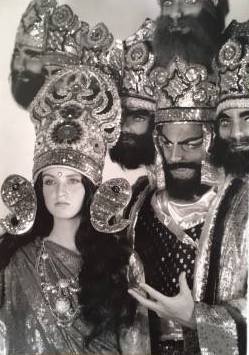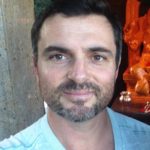 An interview with Tobias Aguirre (‘94) by Haley Campbell (’02).
An interview with Tobias Aguirre (‘94) by Haley Campbell (’02).
A briefer version of this article was published in The Connection, 2016-17, in October.
“If you take care of the present, the future will take care of itself.” This is one of the many positive beliefs that guides Tobias Aguirre’s life. Tobias is the chief executive officer of FishWise, a nonprofit sustainable seafood consultancy in Santa Cruz, dedicated to improving the health of ocean ecosystems. At FishWise, Tobias is working to help individual companies integrate sustainable seafood practices, but more importantly, he is trying to influence the global industry by creating resources and engaging in collaborations to empower the industry to take responsibility for its own long term future, thus benefiting the environment and human welfare.
Growing up, Tobias knew he wanted to live a life of meaning. “There is a reason we’re on Earth,” he said. “Everyone has a calling and life is a process of finding that calling and then rediscovering it and figuring out how to make an impact.” Tobias’s journey has been fueled by a strong work ethic, deep passion, and inherent trust in himself and in life as an unfolding process. He began his education at the Sacramento Waldorf School, and in 1987, when Tobias was 11, he moved with his father and two of his four brothers to Mount Madonna Center (MMC). They lived briefly in a tiny room below the farmhouse and then moved into an old goat shed across from the lake where the Conference Center now stands. This was a fun time to be a kid at MMC – there were many resident children and the Mount Madonna School (MMS) boarding school was a lively place. “I pay homage and respect to our parents’ generation, who were willing to be bold and set out on a new experiment through building community – adopting what seemed like a new, but what is really an ancient way of life. So many of the risks that my parents took have born fruit in my life. Waldorf plus Mount Madonna fostered a set of conditions that allowed me to live a good life based on the hard work and teachings of everyone who came before me and that put energy into me.”
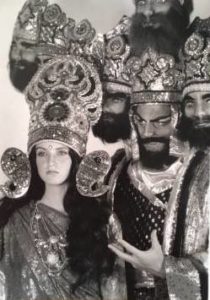 Then, as now, theater was central to school life. Tobias played Ravana in the Ramayana! all four years in high school. His senior year director Sampad Kachuck asked if he would like to be Hanuman instead, but Tobias was too attached to, and intrigued by, his role as Ravana. His powerful performance remains a highlight for long-time community members (including this author). Like today, many high school students played volleyball back then. In 1992, the very first year that MMS joined the Santa Cruz league, it was the area champion, a streak Tobias and his team held onto throughout high school. Tobias and several of his teammates went on to play in the Junior Olympics where he, PK Diffenbaugh (’95), and Jagadish Cheney (‘92) were named All-Americans.
Then, as now, theater was central to school life. Tobias played Ravana in the Ramayana! all four years in high school. His senior year director Sampad Kachuck asked if he would like to be Hanuman instead, but Tobias was too attached to, and intrigued by, his role as Ravana. His powerful performance remains a highlight for long-time community members (including this author). Like today, many high school students played volleyball back then. In 1992, the very first year that MMS joined the Santa Cruz league, it was the area champion, a streak Tobias and his team held onto throughout high school. Tobias and several of his teammates went on to play in the Junior Olympics where he, PK Diffenbaugh (’95), and Jagadish Cheney (‘92) were named All-Americans.
After graduating in 1994, Tobias attended Stanford University where he studied history and 20th century protest movements, such as the Civil Rights Movement and anti-colonialism in Africa. He was fascinated by the ways that generations would clash, as young people sought to throw off the old order and determine their own destinies through the pursuit of greater equality and new societal design. To complete his senior thesis, Tobias attended the Plum Village Summer Opening in southwest France where he studied under Zen Buddhist master Thich Nhat Hanh, who was nominated by Martin Luther King Jr. in 1963 for the Nobel Peace Prize, for his work in the Vietnamese peace movement. Tobias spent five weeks at Plum Village, gaining a deeper understanding of the history and circumstances of the Vietnam War, which inspired Thich Nhat Hanh’s teachings of Engaged Buddhism, a practice that moves meditation to action. Tobias was very moved by the experience and teachings, which built upon an aphorism he had learned from Baba Hari Dass (Babaji) at MMC: “Motivation to bring peace to others is the cause of peace within.” This has remained a central theme in Tobias’s life and work.
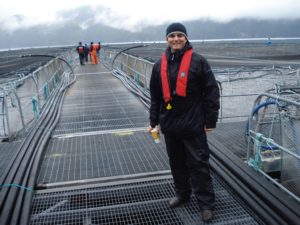 After graduation, Tobias returned to Santa Cruz and worked at Wildwood Natural Foods. “I was the only Stanford-educated tofu delivery guy, possibly in the world, at that time.” He remained at Wildwood for three years, which afforded him the freedom to explore his next steps. “Going through Mount Madonna School, with its structured, focused curriculum – from which I reaped many benefits and greatly enjoyed the fruits of that process – was pretty intense. Then going straight to Stanford and it’s much the same, so probably part of me needed a bit of a break to exhale and think in new ways, and create the space for the next chapter of my life, which eventually I figured out.”
After graduation, Tobias returned to Santa Cruz and worked at Wildwood Natural Foods. “I was the only Stanford-educated tofu delivery guy, possibly in the world, at that time.” He remained at Wildwood for three years, which afforded him the freedom to explore his next steps. “Going through Mount Madonna School, with its structured, focused curriculum – from which I reaped many benefits and greatly enjoyed the fruits of that process – was pretty intense. Then going straight to Stanford and it’s much the same, so probably part of me needed a bit of a break to exhale and think in new ways, and create the space for the next chapter of my life, which eventually I figured out.”
Tobias attended graduate school at University of California (formerly the School of International Relations and Pacific Studies). Thematically, it was a continuation of his undergraduate studies in that he sought grounding in the past to deeper understand the present. He studied language, economics, international relations, nonprofit management, and business strategy under UCSD’s geographical focus of the Pacific Rim. During the summer between his first and second year, he interned at FishWise. The organization was brand new and had just received its first grant of $75,000 from the David and Lucile Packard Foundation, which was funding organizations to help develop sustainable seafood strategies as a means to improve the overall health of the oceans. Tobias participated in a pilot program with New Leaf Community Markets wherein FishWise applied the Monterey Bay Aquarium Seafood Watch science and sustainability recommendations to the point of sale, so that customers could be more informed about their seafood choices and help the ocean environment. New Leaf made more money overall when offering sustainable choices. This success motivated Tobias to focus his second year of graduate school on building towards a career in this field, and upon graduation, he convinced FishWise to hire him as a project manager. He was their fourth employee. The following year, he was named the executive director.
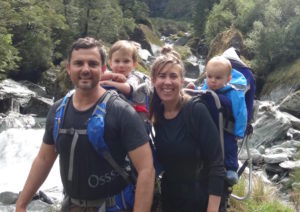 “Dreams come true,” is a platitude that Tobias and his wife Jessica, a yoga teacher and counselor at Salud Para La Gente, often say to each other. “It’s something we believe in and try to model for those around us.” Tobias first met Jessica at a youth retreat at MMC when he was sixteen. Fifteen years later in 2007 they met again at Kim and Carbys Zimmerman’s (’92) wedding in Corralitos. “It was love at second sight,” Tobias said of Jessica. It turned out that they both had plans to spend that summer at Salt Spring Island in British Columbia. “We were extremely fortunate to have three weeks on Salt Spring with nothing to do other than go to yoga class, weed the strawberries in the garden, go on bike rides, chat about life, and fall in love.” By living with gratitude, positive intentions, and a strong work ethic, they have created their dream life. They married in 2011 and have two sons, Arias Moon (four and a half) and Finnegan Star (two and a half). They recently bought a beautiful home in the Aptos Hills. “I’ve never had a grand plan for myself, but if I live life well day to day, life seems to care of me.” He loves going to work where the staff are all passionate, motivated, and as a company they are respected and solving meaningful problems by scaling solutions to the global arena. “I hoped I would create a career for myself where I was inspired to come to work, where I can tackle some of the biggest challenges facing our planet and have a successful career – the dream. You can turn your passions and dreams into a vocation.”
“Dreams come true,” is a platitude that Tobias and his wife Jessica, a yoga teacher and counselor at Salud Para La Gente, often say to each other. “It’s something we believe in and try to model for those around us.” Tobias first met Jessica at a youth retreat at MMC when he was sixteen. Fifteen years later in 2007 they met again at Kim and Carbys Zimmerman’s (’92) wedding in Corralitos. “It was love at second sight,” Tobias said of Jessica. It turned out that they both had plans to spend that summer at Salt Spring Island in British Columbia. “We were extremely fortunate to have three weeks on Salt Spring with nothing to do other than go to yoga class, weed the strawberries in the garden, go on bike rides, chat about life, and fall in love.” By living with gratitude, positive intentions, and a strong work ethic, they have created their dream life. They married in 2011 and have two sons, Arias Moon (four and a half) and Finnegan Star (two and a half). They recently bought a beautiful home in the Aptos Hills. “I’ve never had a grand plan for myself, but if I live life well day to day, life seems to care of me.” He loves going to work where the staff are all passionate, motivated, and as a company they are respected and solving meaningful problems by scaling solutions to the global arena. “I hoped I would create a career for myself where I was inspired to come to work, where I can tackle some of the biggest challenges facing our planet and have a successful career – the dream. You can turn your passions and dreams into a vocation.”
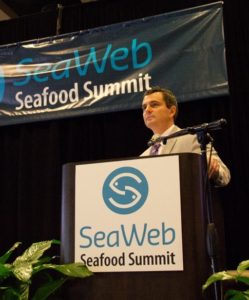 More than a billion people rely on seafood as their primary source of protein every day. With such power, the industry can be a force for good or harm. By engaging in collaborations around the world, FishWise helps to create science-based programs and resources for an incredibly complex industry. But, “If your seafood is environmentally sustainable, but is connected with modern day slavery, you’ve only solved part of the problem,” Tobias said. Recent investigative journalism uncovered labor abuses and human trafficking in seafood supply chains, in Thailand and other countries. Vulnerable populations of migrants were promised jobs at resorts, but were then shipped out to sea for three years where they were forced to work around the clock and were threated with violence or death. FishWise does outreach to both labor and environmental groups to integrate the conversation and approaches and to act as a liaison to address the all of these issues in an integrated way. Through collaboration they create resources to understand the complexities of the problems and potential solutions. Tobias also works with governments, philanthropic foundations, nonprofit organizations, and businesses connected to the seafood industry that seek advisement of funding strategies, conservation initiatives, and new design and implementation of sustainable practices.
More than a billion people rely on seafood as their primary source of protein every day. With such power, the industry can be a force for good or harm. By engaging in collaborations around the world, FishWise helps to create science-based programs and resources for an incredibly complex industry. But, “If your seafood is environmentally sustainable, but is connected with modern day slavery, you’ve only solved part of the problem,” Tobias said. Recent investigative journalism uncovered labor abuses and human trafficking in seafood supply chains, in Thailand and other countries. Vulnerable populations of migrants were promised jobs at resorts, but were then shipped out to sea for three years where they were forced to work around the clock and were threated with violence or death. FishWise does outreach to both labor and environmental groups to integrate the conversation and approaches and to act as a liaison to address the all of these issues in an integrated way. Through collaboration they create resources to understand the complexities of the problems and potential solutions. Tobias also works with governments, philanthropic foundations, nonprofit organizations, and businesses connected to the seafood industry that seek advisement of funding strategies, conservation initiatives, and new design and implementation of sustainable practices.
For example, FishWise is working with the World Wildlife Fund, Future of Fish, and the Global Food Traceability Center to develop traceability practices. “We want governments to require and enforce traceability,” Tobias explained, “but that also needs to be informed and led by the industry itself”. President Obama initiated a Presidential Task Force that resulted in a seafood import-monitoring program wherein suppliers are required to provide traceability information in order to export products into the U.S. market. Starting in October 2017, Tobias and FishWise began working more directly with the U.S. government through an ambitious new collaboration with the United States Agency for International Development (USAID), and leading foundations to increase the adoption of electronic traceability. The Seafood Alliance for Legality and Traceability is a five-year and $5.3M initiative that will create a global alliance for knowledge exchange and action that aims to promote legal and sustainable fisheries through improved transparency in seafood supply chains. “Seafood is the most widely traded food commodity in the world. The global nature of the industry poses unique challenges to sustainability,” said Tobias. “If we can more effectively document and trace our seafood and use that information to empower fisheries managers, we will be one big step closer to long-term sustainability of the industry.”
Since 2010, FishWise has helped Safeway transition more than 29 million pounds of seafood to more responsible sources. As a result, Safeway has been ranked by Greenpeace to be one of the most sustainable national grocers of seafood. Since Safeway merged with Albertsons companies, they are extending the successful Safeway approach to the new side of the business with “a top 20 by 2022 commitment,” meaning the top 20 seafood categories will be sustainable by 2022.
Tobias is on also on the advisory committee of the Gordon and Betty Moore Foundation’s Oceans and Seafood Markets Initiative, a five-year and $50 million collaboration to eliminate overfishing and coastal habitat degradation by 2025. Tobias played an instrumental role in the creation of the Conservation Alliance for Seafood Solutions. The Alliance is an international collaboration with 38 organizations dedicated to assisting the seafood industry in its transition to responsible practices. Together, Alliance organizations work directly with more than 80% of the North America retail community and have extensive activities worldwide. Tobias was awarded the Alliance’s inaugural Spirit of the Alliance Award and was a key architect in the creation of the Common Vision for Sustainable Seafood.
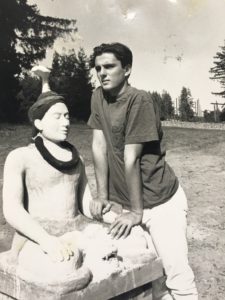 With every project and collaboration, Tobias sets out to help people become leaders in the industry. His core organizational philosophy is that, “We’re all leaders and we’re all more ready than we think. I want to empower people to live and embody that.” His work revolves around building a community of practice, which he carries from his Mount Madonna days. “There is no better description for MMC than a community of practice.” Drawing from those early experiences has allowed him to live a life where he can create environments where everyone’s voice is heard and respected and everyone contributes in their own way. “This has become my way of life professionally and I find that my staff of now thirty people really thrive in such an atmosphere.”
With every project and collaboration, Tobias sets out to help people become leaders in the industry. His core organizational philosophy is that, “We’re all leaders and we’re all more ready than we think. I want to empower people to live and embody that.” His work revolves around building a community of practice, which he carries from his Mount Madonna days. “There is no better description for MMC than a community of practice.” Drawing from those early experiences has allowed him to live a life where he can create environments where everyone’s voice is heard and respected and everyone contributes in their own way. “This has become my way of life professionally and I find that my staff of now thirty people really thrive in such an atmosphere.”
He credits Mount Madonna Center and School for launching him into a successful life. “Going to MMS makes you realize that people are trying to live with meaning, not materialistic pursuits.” He kept that mindset as he transitioned to Stanford, UCSD, and FishWise. Every time he is on a panel or speaking at a conference, he thinks about being onstage and remembers that he’s been doing this since he was in seventh grade, in performing arts classes. In that sense, my former drama teacher Martin Sampad Kachuck is always with me.” He also sometimes draws upon his yoga practice. “If I get nervous, then I’ll do slow breathing to center or maybe go to a corner and practice an alternate breathing technique. He also often reflects on teacher Sadanand Mailliard’s consistent inquiry of what it means to live a meaningful life. Teacher Premdas Rohan taught him that having fun and playing is just as important as learning and studying.
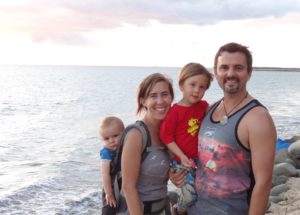 Mount Madonna remains a community touchstone and foundation in Tobias’ life. “All of the family and friends that I have there… that will always be a grounding force. It will always be a home to go back to.” Someday he hopes his two boys will help put more volleyball championship banners on the gym walls. Through remaining grounded in community and meaning, he hopes to “balance the hustle and bustle and responsibility of my work with really staying grounded in place and time – enjoying individual moments with family, closing the laptop and not checking email and instead jumping in the pool and investigating little creatures around our property, and stockpiling some of those moments because I’m sure at some point life is going to feel fleeting. I want to feel like I really enjoyed and savored all of that.”
Mount Madonna remains a community touchstone and foundation in Tobias’ life. “All of the family and friends that I have there… that will always be a grounding force. It will always be a home to go back to.” Someday he hopes his two boys will help put more volleyball championship banners on the gym walls. Through remaining grounded in community and meaning, he hopes to “balance the hustle and bustle and responsibility of my work with really staying grounded in place and time – enjoying individual moments with family, closing the laptop and not checking email and instead jumping in the pool and investigating little creatures around our property, and stockpiling some of those moments because I’m sure at some point life is going to feel fleeting. I want to feel like I really enjoyed and savored all of that.”
Tobias is excited to see where his work will go and what his talented staff at FishWise can achieve. He hopes that we will soon see a seafood industry that respects and values the people who are responsible for bringing our food to us, and he hopes for a demonstrable change in the health of fisheries and oceans. “That spirit of being bold and trying to improve society has never been more important. So my advice to fellow alumni and current students of Mount Madonna School is to aspire to make a difference in the world; there’s no greater journey. As Paul Hawken said, ‘you are brilliant and the Earth is hiring’.”
####
What can consumers do to support the health of the oceans and the seafood industry?
- Find a grocery store that has a publically available sustainable seafood policy (usually on their website) that explains what they’re doing and what credible programs guide their choices
- Buy local seafood. California and the U.S. in general have some of the best fishery management, so farmers markets are good places to shop
- Download the Seafood Watch app for decision-making at your fingertips
- The lower on the food chain the sea creature is, the more sustainable they tend to be because they reproduce quicker to be more abundant. For example, farmed shellfish is generally very sustainable, as are sardines and seaweed
- Throw out the myth of only buying “wild-caught.” Done responsibly, aquaculture fills the gap for production that wild fisheries cannot keep up with, and it often offers many sustainable options. Catfish, trout and shellfish are good farmed options
####
Contact: Leigh Ann Clifton, Director of Marketing & Communications,

